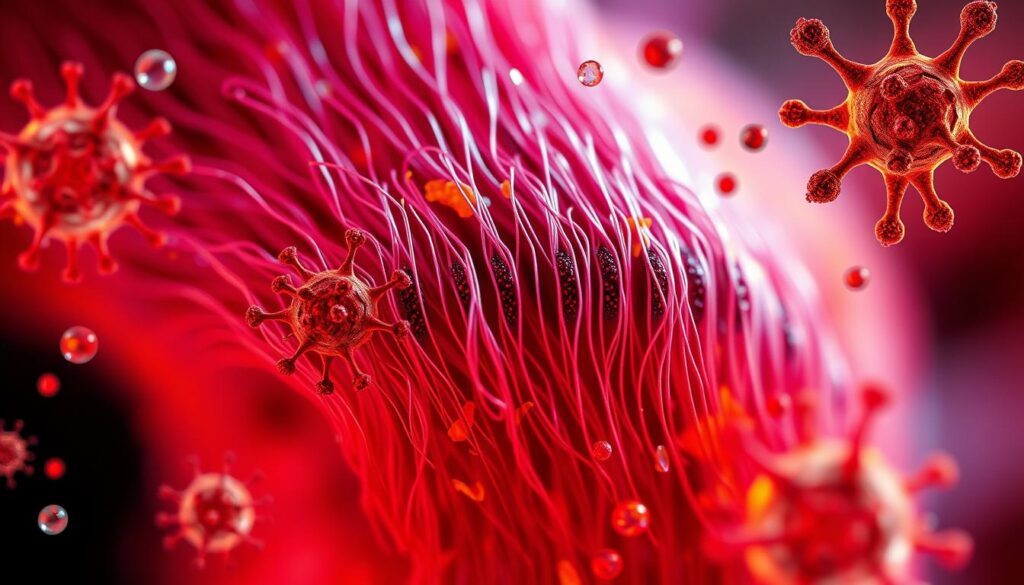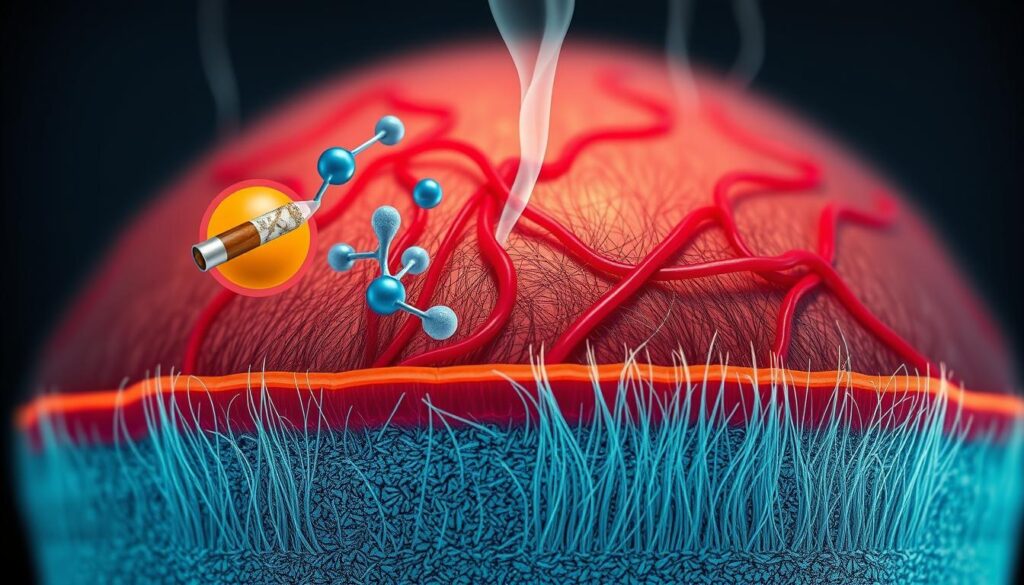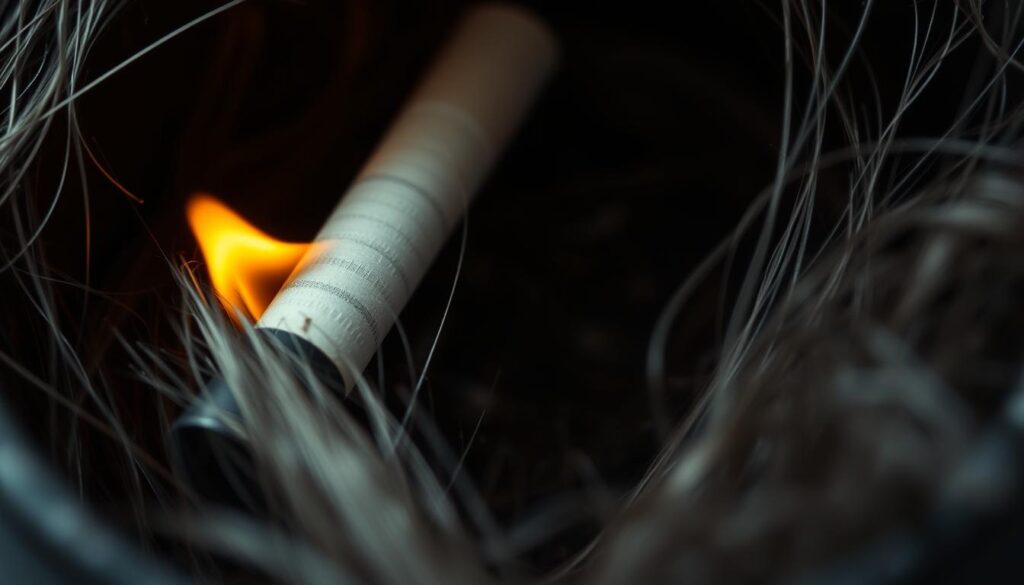Contents
Explore the connection between cigarette smoking and hair loss. Discover how nicotine affects hair health and whether quitting can help regrow hair.
Ever wondered if your smoking habit could be causing your hair to thin? You’re not alone. As a health journalist, I’ve looked into this question. The results might surprise you. Studies show a link between cigarette smoking and hair loss, worrying smokers worldwide.
Tobacco smoke has over 7,000 chemicals, many harmful to your health. These substances can affect your hair follicles. A 2020 study found hair loss in 425 out of 500 smokers and 200 out of 500 nonsmokers.
Smoking’s effect on hair health is well-known. A 1996 study linked smoking to premature grey hair and hair loss. Recent studies have also found a strong link.
But how does smoking lead to hair loss? It’s complex. Nicotine and chemicals can harm hair follicles and cause DNA damage. Smoking also leads to inflammation and fibrosis, hurting hair health.
Short Summary
- Smoking is linked to premature grey hair and hair loss
- Studies show a higher prevalence of hair loss in smokers compared to non-smokers
- Nicotine and other chemicals in cigarettes can damage hair follicles
- Smoking affects hair health through multiple mechanisms
- Quitting smoking may help improve overall hair health
The Impact of Smoking on Hair Health
Smoking cigarettes can harm our hair. The toxins in smoke cause hair loss and early graying. Let’s look at how smoking affects our hair and the science behind it.
Oxidative Stress and DNA Damage
Smoking makes our bodies produce more free radicals, leading to oxidative stress. This can hurt the DNA of hair follicle cells, which can slow down hair growth. Studies show smokers often lose hair and go gray early.

- Male smokers are 1.93 times more likely to be bald
- Smokers are 4.40 times more likely to have gray hair
- Heavy smokers (≥10 cigarettes daily) are almost three times more likely to have moderate/severe hair loss
Inhaling smoke cuts down blood flow to hair follicles. This means less nutrients and more waste. This can hurt hair follicles and lead to hair loss. A 2020 study found 85% of young male smokers had hair loss, while only 40% of non-smokers did.
| Hair Loss Grade | Smokers | Non-smokers |
|---|---|---|
| Grade 3 | 47% | 10% |
| Grade 4 | 24% | 0% |
These results show smoking’s big impact on hair health. Quitting smoking is key for those worried about hair loss and early graying.
Mechanisms of Smoking-Induced Hair Loss
Smoking harms hair health in many ways. It releases harmful substances that damage hair follicles and mess with the hair growth cycle. Smoking changes important enzymes needed for hair growth.
Smoking also affects hormones, which is bad for hair. It makes estrogen levels go down, which hurts hair growth. This mix of effects makes smoking a big risk for hair loss.

- 85% of male smokers aged 20-35 showed signs of male pattern baldness, compared to 40% of non-smokers
- 47% of smokers experienced advanced (Norwood stage 3) hair loss
- Smokers consuming over 10 cigarettes daily had triple the risk of moderate-to-severe male pattern baldness
These facts show how smoking hurts hair health. Smoking’s toxins damage hair follicle cells and mess with hair growth. Nicotine also makes stress hormones, throwing off the balance of hair growth.
Cigarette smoking and Hair loss
A 2020 study showed a strong link between smoking and hair loss in young men. It found that 47% of smokers aged 20-35 had severe hair loss. Only 10% of non-smokers reached the same level of baldness.
Smoking also changes hair color. A 2013 study found a link between smoking and early hair graying. This shows how smoking harms our bodies at a deep level.

Smoking does more than make hair look bad. It cuts off blood flow to hair roots, hurting collagen production. This makes hair dry and easy to break. For those with female-pattern baldness, smoking can make it worse.
| Hair Loss Stage | Smokers | Non-smokers |
|---|---|---|
| Grade 3 (Hamilton-Norwood) | 47% | 5% |
| Grade 4 (Hamilton-Norwood) | 24% | 5% |
| Premature Graying (before 30) | High risk | Low risk |
These studies highlight the need to quit smoking. It’s good for your health and your hair. If you’re facing hair loss, stopping smoking could help you have healthier hair.
Smoking and Hair Transplant Complications
Smoking can really affect how well a hair transplant works. I’ve looked into this a lot, and smokers have a bigger chance of problems during and after surgery.
Increased Risk of Complications
Smokers who get hair transplants are more likely to have issues. Cigarette smoke’s chemicals can make blood flow poor. This is key for the new hair to grow. It can cause:
- Skin tissue death on the scalp
- Prolonged healing times
- Excessive bleeding during the procedure
- Extended crusting on the scalp
Just one cigarette can cut oxygen to skin tissue by up to 50 minutes. This makes healing hair transplants harder and can cause scalp problems.
Doctors say to quit smoking at least 15 days before and three weeks after the surgery. Some suggest stopping for up to 6 months before to help blood flow and graft survival.
“Smoking can compromise the success of hair restoration procedures by interfering with the body’s natural healing processes and reducing blood flow to the scalp.”
Knowing these risks helps patients make better choices for their hair transplant. It can also help them improve their chances of a good result.
Reversibility of Smoking-Related Hair Loss
Stopping smoking can help your hair grow back and get healthier. When you quit, your blood flows better to your scalp. This brings important nutrients to your hair roots. This can fix some damage from smoking.
Long-term smokers might need more help to get their hair to grow back. Using Rogaine (minoxidil) can help with regrowth. For serious hair loss, you might need hair transplants or grafts.
It can take months to see your hair get thicker and fuller. Being patient is important. To help your hair grow back, I suggest:
- Using minoxidil to stimulate hair growth
- Increasing vitamin C intake to boost the immune system
- Trying low-level laser therapy to stimulate hair follicles
- Maintaining a healthy diet rich in proteins and vitamins
Quitting smoking is key for your hair to grow back. It’s the first step to better hair and health. If quitting is hard, get help from a pro for ways to stop smoking.
| Time After Quitting | Potential Hair Benefits |
|---|---|
| 1-2 weeks | Improved blood circulation to scalp |
| 1-3 months | Reduced inflammation, better nutrient supply to follicles |
| 3-6 months | Possible visible improvements in hair thickness |
| 6-12 months | Noticeable hair regrowth for some individuals |
Conclusion
Smoking and hair loss are closely linked. Studies show smoking hurts hair health. For example, 85% of smokers in a study of 1,000 men had male pattern baldness. This is much higher than the 40% of non-smokers.
Stopping smoking helps both hair and overall health. Quitting can make blood flow better to hair follicles in a month. It also lowers the risk of many diseases. For instance, lung cancer risk goes down a lot, and heart disease risk becomes like a non-smoker’s after 5-15 years.
Preventing smoking is key to keeping our hair and health safe. If you smoke, quitting is still possible. There are many resources to help you quit smoking. Remember, stopping smoking helps not just your hair but your whole body. Your body will be grateful for this change.
References:
https://www.ncbi.nlm.nih.gov/pubmed/12673073
https://www.ncbi.nlm.nih.gov/pubmed/10713476
https://www.ncbi.nlm.nih.gov/pubmed/12673073
https://www.ncbi.nlm.nih.gov/pubmed/10713476
FAQ
Does smoking cause hair loss?
Yes, smoking is linked to hair loss. Smokers often see hair loss early and more severely than those who don’t smoke.
How does smoking lead to hair loss?
Smoking harms hair through several ways. It causes stress, damages hair cells’ DNA, and cuts off blood flow to hair roots. It also boosts inflammation, scars hair follicles, and changes hormones that affect hair growth.
It’s not clear if hair loss from smoking can be fully fixed. Quitting smoking can help your health and might help your hair. But, it’s unlikely to bring back all the hair for male or female pattern baldness. Some might see new hair growth if their hair loss was due to a medical issue.
Can smoking affect the success of hair transplants?
Smokers face a higher risk of problems during hair transplants. This can make hair restoration less successful and cause more scalp issues.
Does quitting smoking help with hair health?
Stopping smoking boosts your health, including your hair’s health. Within a few weeks to months, better blood flow can help your hair follicles and overall hair health. Quitting also stops you from being exposed to harmful chemicals and stress that cause hair loss.
There’s no special treatment for hair loss from smoking. But, using Rogaine (minoxidil) might help some regrowth. Quitting smoking with help from nicotine replacement therapy, prescription drugs, other therapies, and support groups can also improve your health and help your hair.
